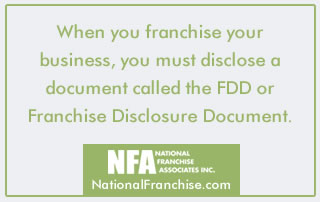In my over three decades of experience as a franchise consultant, I am often asked “When franchising your business, what are the rules of franchise disclosure?”
When franchising your business, all Franchisors must disclose in a document called the Franchise Disclosure Document (FDD), certain required information regarding the franchise program and the franchise company.
 The FTC Rule on Franchising (the governing law requiring disclosure to franchise prospects) requires the FDD to be prepared in a precise manner when franchising your business. You must include 23 topics of information. When franchising your business, the goal of the disclosure process is to ensure the franchise prospect is given the information he/she needs in order to make an informed decision about buying that particular franchise.
The FTC Rule on Franchising (the governing law requiring disclosure to franchise prospects) requires the FDD to be prepared in a precise manner when franchising your business. You must include 23 topics of information. When franchising your business, the goal of the disclosure process is to ensure the franchise prospect is given the information he/she needs in order to make an informed decision about buying that particular franchise.
The FTC Rule on Franchising further requires all Franchisors to give a current FDD to the franchise prospect no later than the first face-to-face meeting. It is possible to disclose the prospect by email or by sending the FDD package of legal documents by FedEx or the U.S. Post Office when franchising your business.
What must the franchise company disclose in the FDD? Some of the required Items when franchising your business are information about the history of the Franchisor and its parent, predecessor or affiliated company or companies, a biography of each officer, director or manager involved in the franchise company, certain types of litigation against the company or the executives and management disclosed in the FDD, the fees to be paid to the Franchisor (Initial Franchise Fees, Royalties, etc.).
Other Items to be disclosed in the FDD when franchising your business include:
- An estimate of the Franchise Owner’s Initial Investment (initial rent, leasehold improvements, initial inventory and supplies, etc.)
- The disclosure rules also require a financial statement for the Franchisor.
Most Franchisors do not reveal earnings claims or projections (called Financial Performance Representations in the FDD disclosure rules). However, if you choose to do so when franchising your business, this information must be set forth in Item 19 of the FDD.
The disclosure laws further require that the Franchise Agreement must be attached to the FDD. This document is the contract to be signed by the Franchisor and the franchise prospect when franchising your business. A 14-calendar day “cooling off” period from the day the franchise prospect receives the FDD and Franchise Agreement is also mandated by franchise disclosure rules.
While this might sound complicated, it is highly beneficial to both the Franchisor and the Franchise Owner when franchising your business for a franchise prospect to make an informed decision. A franchise is a long-term business relationship which should not be entered into on a whim. Properly drafting your franchise legal documents and disclosing prospective Franchisees is an area where an experienced franchise attorney or consultant can be of considerable assistance when franchising your business.
Thinking About Franchising?
NFA Franchise Consultants have the experience to help businesses franchise. Just watch and listen to some of our client case studies and video testimonials. We can HELP YOU and it doesn’t cost anything to call and talk to us!
So, if you are still asking the “should I franchise my business” question over and over with no clear direction, give us a call at (706) 356-5637, or contact us through our online form. We look forward to helping you take your business to the next level and beyond.
